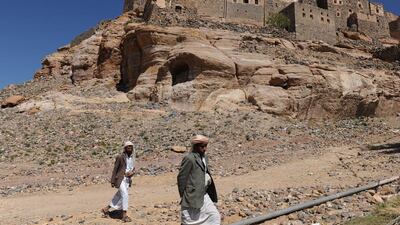For decades now, the Yemeni people have suffered from bad governance, underdevelopment and prolonged civil conflict.
During the past year, Yemen’s pain has been compounded by a devastating air war.
Last week, the New York Times ran an editorial under the headline “Hints of an End to the Fighting in Yemen”. The hints were that recent meetings between the Saudi government and elements of Yemen’s rebel leadership had concluded with announcements of a prisoner exchange, a ceasefire due to come into effect on April 10 and peace talks planned for April 17 in Kuwait. The assessment of some analysts was that the paper might be overly optimistic, but there is at least some hope that Yemen may be turning a corner.
While there have been other periods of upheaval in Yemen’s past, the recent chapter began in the aftermath of the unrest that rocked the country after the Arab Spring. Yemen has been a desperately poor country that, even in the best of times, had been politically unstable. There have been tribal conflicts and a conflict between the north and south, and it has been home to a branch of Al Qaeda. The decades-long administration of Ali Abdullah Saleh, once heralded as a model “emerging democracy” had ossified and become corrupt with rampant nepotism.
As the country convulsed, the GCC and the UN attempted to stabilise the situation by making modest reforms in the governance of Yemen. The agreement they reached led to the removal of Mr Saleh, replacing him with Abdrabu Mansur Hadi.
Mr Hadi laid out a reform agenda that Mr Saleh worked to obstruct. It was at that point that the government was overthrown by a band of rebels in coalition with elements of Yemen’s army who had remained loyal to Mr Saleh.
As the rebels moved southward, Saudi Arabia and its GCC partners became concerned. They were angered that the compromise they had worked to achieve had been undone. What heightened their upset were the boasts coming from some in Iran who claimed that Tehran now had a presence in four Arab capitals (Baghdad, Damascus, Beirut and Sanaa).
While there had been some debate as to the extent of Iranian support for the Houthi takeover, the Iranian claims and reports of shipments of arms and supplies to Sanaa created a reality that Saudi Arabia would not ignore or tolerate.
Already reeling from the perception that Iran had become an ascendant power in Iraq and from Iran's political and military involvement in supporting the Assad government in Syria, the Saudis were determined to draw the line in Yemen.
Compounding their concern were the P5+1 negotiations with Iran over that country's nuclear programme. Saudi Arabia and other GCC countries feared that this process would not only result in a nuclear agreement, but would legitimise Iran in the eyes of the West, end sanctions and free up billions of dollars, providing the Iranians with resources to pursue their quest for regional hegemony.
And so a year ago, a Saudi-led coalition began air strikes with the intention of turning back the Houthi rebellion and restoring the government of Mr Hadi.
The past year has been especially devastating for Yemen. According to United Nations statistics, over 6,000 people have been killed, 30,000 wounded and two-and-a-half million have been internally displaced.
Because of Yemen's difficult and unwelcoming terrain and the fact that it is bordered on two sides by water, there is nowhere for refugees to go. More than 20 million Yemenis are in dire need of humanitarian care, including 19 million who lack clean water and sanitation, 14 million who lack health care, and more than two million (of whom 300,000 are children) who face severe malnutrition. Taking advantage of the chaos, Al Qaeda in the Arabian Peninsula has expanded its reach in the country.
And so, it can only be hoped that the hints are in fact more than just hints. That the warring sides have come to the conclusion that this madness must end and that negotiations will usher in a process of political compromise and national reconciliation.
At this point, the real agenda for Yemen will not only include political reform and a unifying of Yemeni and regional forces to defeat Al Qaeda, but reconstruction and a major international effort, led by the GCC and the US, to address the fundamental needs of Yemen’s long suffering people.
Dr James Zogby is the president of the Arab American Institute
On Twitter: @aaiusa


